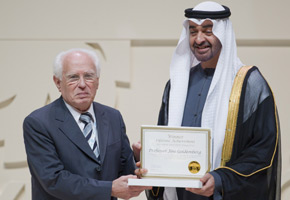

Former University of São Paulo president receives a US$ 500,000 Lifetime Achievement award as the winner of the Zayed Future Energy Prize in the United Arab Emirates
Former University of São Paulo president receives a US$ 500,000 Lifetime Achievement award as the winner of the Zayed Future Energy Prize in the United Arab Emirates.
Former University of São Paulo president receives a US$ 500,000 Lifetime Achievement award as the winner of the Zayed Future Energy Prize in the United Arab Emirates.

Former University of São Paulo president receives a US$ 500,000 Lifetime Achievement award as the winner of the Zayed Future Energy Prize in the United Arab Emirates
By Frances Jones
Agência FAPESP – Physicist José Goldemberg, who previously served as the Minister of Education, the Secretary of the Environment and the President of the Universidade de São Paulo (USP), garnered further international acclaim in January. He was awarded the Zayed Future Energy Prize Life Achievement Award, granted to outstanding professionals in the area of renewable energy.
Goldemberg received the $500,000 prize from Sheik Mohammed bin Zayed Al Nahyan, prince of Abu Dhabi, in a ceremony held in the capital of the United Arab Emirates (UAE).
“I was honored to receive this award not only because it is recognition of my scientific work but also because it recognizes bioenergy as an important ingredient for a sustainable future,” commented Goldemberg in an interview with Agência FAPESP.
This marks the fifth year the award has been granted by the foundation created by the son and successor of Sheik Zayed bin Sultan Al Nahyan, founder of the UAE, who died in 2004.
According to Goldemberg, in previous years, the award recognized general works in photovoltaic and aeolic energy and energy conservation. “It is the first time the foundation has given the award to someone whose work was not in this area, but in bioenergy, which is noteworthy because it is an award granted in the Middle East,” he said. The United Arab Emirates has one of the ten largest oil reserves in the world.
This year’s jury was composed of personalities such as Ólafur Ragnar Grímsson, President of Iceland, Susan Hokfield, former president of the Massachusetts Institute of Technology, and Leonardo DiCaprio, actor and activist. The jury evaluated issues such as impact, innovation, long-term vision and leadership in the areas of renewable energy and sustainability throughout the careers of the nominees.
In addition to the award granted to Goldemberg, which is focused on individuals, awards are given in the categories of mid-sized companies, high schools, nongovernmental organizations and large companies, the last of which was won by Siemens this year. In total, Masdar, Abu Dhabi’s Energy Company of the Future, distributed US$ 4 million in prizes.
Masdar is also the name of a neighborhood located 10 kilometers from downtown Abu Dhabi that is entirely powered by solar energy. “It is all high-tech,” commented Goldemberg, who visited the location. “It is expensive too. But these things start out expensive, and later the price drops.”
Sustainability
According to Goldemberg, the award is an incentive for companies and individuals to continue pursuing a more sustainable future. “They award companies or people who are working for sustainability because this was the vision of the former sheik [Zayed bin Sultan Al Nahyan].”
In 2007, Time magazine chose Goldemberg as one of its “heroes of the environment.” In 2008, he received the Blue Plane from the Asahi Glass Foundation in Japan, one of the most important awards in ecology, for the important role he played in Rio 92, among other reasons.
“I have had a long career. I began in the area of energy at 40 or 50 years of age. What impressed me is that the comfort of a significant portion of humanity is based on fossil fuels,” explained Goldemberg, who began his career as a nuclear physicist. “The civilization we have – the civilization of the 20th century – is based on fossil fuel. This situation can’t last.”
“We need to have more sustainable solutions, such as energies that come from the sun,” he said.
At the end of the 1970s, Goldemberg published a bioenergy article in Science magazine in which he calculated the quantity of energy needed to produce ethanol from three plants– cassava, sorghum and sugarcane – showing the efficiency of sugarcane.
“I helped to identify the positive characteristics of bioenergy. People have been producing sugar and ethanol for 30 years but were not aware that ethanol is essentially solar energy transformed into a liquid. My work published in Science shows this,” he added.
For more information on the prize, visit: www.zayedfutureenergyprize.com/en/about-zfep.
Republish
The Agency FAPESP licenses news via Creative Commons (CC-BY-NC-ND) so that they can be republished free of charge and in a simple way by other digital or printed vehicles. Agência FAPESP must be credited as the source of the content being republished and the name of the reporter (if any) must be attributed. Using the HMTL button below allows compliance with these rules, detailed in Digital Republishing Policy FAPESP.





